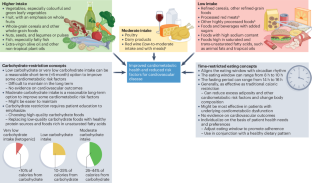Dietary patterns to promote cardiometabolic health
IF 41.7
1区 医学
Q1 CARDIAC & CARDIOVASCULAR SYSTEMS
引用次数: 0
Abstract
Multiple professional societies recommend the Mediterranean and/or Dietary Approaches to Stop Hypertension dietary patterns in their cardiovascular disease prevention guidelines because these diets can improve cardiometabolic health and reduce the risk of cardiovascular events. Furthermore, low sodium intake can be particularly beneficial for patients with hypertension. Carbohydrate restriction, with an emphasis on including high-quality carbohydrates and limiting refined starches and foods and beverages with added sugars, can promote weight loss and cardiometabolic benefits in the short term, compared with higher carbohydrate intake. Evidence is lacking for sustained, long-term effects of low carbohydrate and very low carbohydrate intake on cardiometabolic risk and cardiovascular outcomes. Time-restricted eating, in the context of an overall healthy dietary pattern, can promote cardiometabolic health by aligning food intake with the circadian rhythm, although its effect on hard clinical outcomes remains to be proven. Although there is no one dietary pattern that is appropriate for all patients, engaging in shared decision-making with patients, utilizing behaviour-change principles and engaging members of the health-care team, such as registered dietitian nutritionists, can lead to substantial improvement in the lifestyle and overall health trajectory of a patient. Emphasizing the similarities, rather than differences, of recommended dietary patterns, which include an emphasis on vegetables, fruits, legumes, nuts, whole grains and minimally processed protein foods, such as fatty fish or plant-based proteins, can simplify the process for both patients and clinicians alike. Various dietary patterns have been proposed to improve cardiometabolic health. In this Review, Pagidipati et al. emphasize the commonalities between recommendations on what to eat (Mediterranean, Dietary Approaches to Stop Hypertension and low-carbohydrate or ketogenic diets) and the possible benefits of time-restricted eating and intermittent fasting.


促进心脏代谢健康的饮食模式
多个专业协会在其心血管疾病预防指南中推荐地中海和/或 "膳食法防治高血压 "饮食模式,因为这些饮食可以改善心血管代谢健康,降低心血管事件的风险。此外,低钠摄入对高血压患者尤其有益。限制碳水化合物摄入,重点是摄入优质碳水化合物,限制精制淀粉以及添加糖的食品和饮料,与增加碳水化合物摄入量相比,可在短期内减轻体重并促进心血管代谢。至于低碳水化合物和极低碳水化合物摄入对心脏代谢风险和心血管后果的持续、长期影响,目前还缺乏证据。在整体健康饮食模式的背景下,限时进食可使食物摄入量与昼夜节律保持一致,从而促进心血管代谢健康,但其对硬性临床结果的影响仍有待证实。虽然没有一种饮食模式适合所有患者,但与患者共同决策、利用行为改变原则以及让医疗团队成员(如注册营养师)参与进来,可以大大改善患者的生活方式和整体健康轨迹。强调推荐膳食模式的相似性而非差异性,包括强调蔬菜、水果、豆类、坚果、全谷物和尽量少加工的蛋白质食品(如肥鱼或植物性蛋白质),可以简化患者和临床医生的过程。
本文章由计算机程序翻译,如有差异,请以英文原文为准。
求助全文
约1分钟内获得全文
求助全文
来源期刊

Nature Reviews Cardiology
医学-心血管系统
CiteScore
53.10
自引率
0.60%
发文量
143
审稿时长
6-12 weeks
期刊介绍:
Nature Reviews Cardiology aims to be the go-to source for reviews and commentaries in the scientific and clinical communities it serves. Focused on providing authoritative and accessible articles enriched with clear figures and tables, the journal strives to offer unparalleled service to authors, referees, and readers, maximizing the usefulness and impact of each publication. It covers a broad range of content types, including Research Highlights, Comments, News & Views, Reviews, Consensus Statements, and Perspectives, catering to practising cardiologists and cardiovascular research scientists. Authored by renowned clinicians, academics, and researchers, the content targets readers in the biological and medical sciences, ensuring accessibility across various disciplines. In-depth Reviews offer up-to-date information, while Consensus Statements provide evidence-based recommendations. Perspectives and News & Views present topical discussions and opinions, and the Research Highlights section filters primary research from cardiovascular and general medical journals. As part of the Nature Reviews portfolio, Nature Reviews Cardiology maintains high standards and a wide reach.
 求助内容:
求助内容: 应助结果提醒方式:
应助结果提醒方式:


